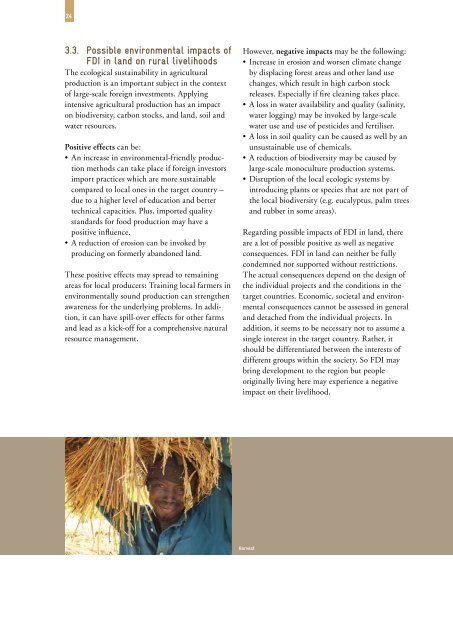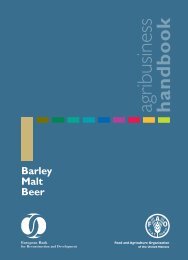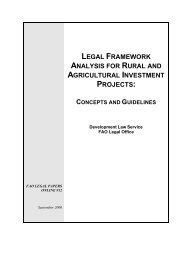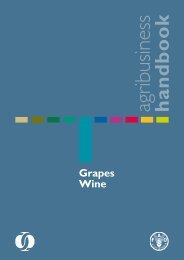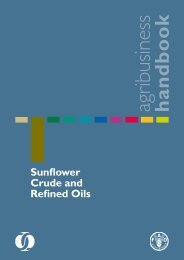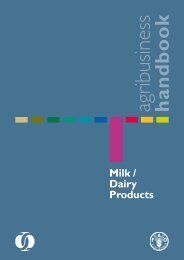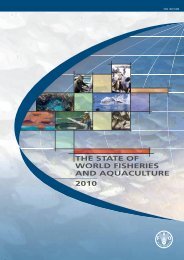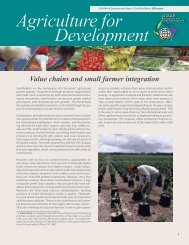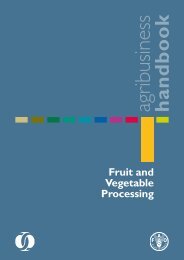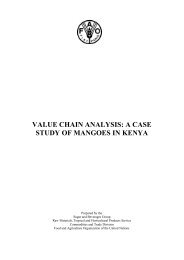Foreign Direct Investment (FDI) in Land in developing countries
Foreign Direct Investment (FDI) in Land in developing countries
Foreign Direct Investment (FDI) in Land in developing countries
- No tags were found...
Create successful ePaper yourself
Turn your PDF publications into a flip-book with our unique Google optimized e-Paper software.
243.3. Possible environmental impacts of<strong>FDI</strong> <strong>in</strong> land on rural livelihoodsThe ecological susta<strong>in</strong>ability <strong>in</strong> agriculturalproduction is an important subject <strong>in</strong> the contextof large-scale foreign <strong>in</strong>vestments. Apply<strong>in</strong>g<strong>in</strong>tensive agricultural production has an impacton biodiversity, carbon stocks, and land, soil andwater resources.Positive effects can be:• An <strong>in</strong>crease <strong>in</strong> environmental-friendly productionmethods can take place if foreign <strong>in</strong>vestorsimport practices which are more susta<strong>in</strong>ablecompared to local ones <strong>in</strong> the target country –due to a higher level of education and bettertechnical capacities. Plus, imported qualitystandards for food production may have apositive <strong>in</strong>fluence.• A reduction of erosion can be <strong>in</strong>voked byproduc<strong>in</strong>g on formerly abandoned land.These positive effects may spread to rema<strong>in</strong><strong>in</strong>gareas for local producers: Tra<strong>in</strong><strong>in</strong>g local farmers <strong>in</strong>environmentally sound production can strengthenawareness for the underly<strong>in</strong>g problems. In addition,it can have spill-over effects for other farmsand lead as a kick-off for a comprehensive naturalresource management.However, negative impacts may be the follow<strong>in</strong>g:• Increase <strong>in</strong> erosion and worsen climate changeby displac<strong>in</strong>g forest areas and other land usechanges, which result <strong>in</strong> high carbon stockreleases. Especially if fire clean<strong>in</strong>g takes place.• A loss <strong>in</strong> water availability and quality (sal<strong>in</strong>ity,water logg<strong>in</strong>g) may be <strong>in</strong>voked by large-scalewater use and use of pesticides and fertiliser.• A loss <strong>in</strong> soil quality can be caused as well by anunsusta<strong>in</strong>able use of chemicals.• A reduction of biodiversity may be caused bylarge-scale monoculture production systems.• Disruption of the local ecologic systems by<strong>in</strong>troduc<strong>in</strong>g plants or species that are not part ofthe local biodiversity (e.g. eucalyptus, palm treesand rubber <strong>in</strong> some areas).Regard<strong>in</strong>g possible impacts of <strong>FDI</strong> <strong>in</strong> land, thereare a lot of possible positive as well as negativeconsequences. <strong>FDI</strong> <strong>in</strong> land can neither be fullycondemned nor supported without restrictions.The actual consequences depend on the design ofthe <strong>in</strong>dividual projects and the conditions <strong>in</strong> thetarget <strong>countries</strong>. Economic, societal and environmentalconsequences cannot be assessed <strong>in</strong> generaland detached from the <strong>in</strong>dividual projects. Inaddition, it seems to be necessary not to assume as<strong>in</strong>gle <strong>in</strong>terest <strong>in</strong> the target country. Rather, itshould be differentiated between the <strong>in</strong>terests ofdifferent groups with<strong>in</strong> the society. So <strong>FDI</strong> maybr<strong>in</strong>g development to the region but peopleorig<strong>in</strong>ally liv<strong>in</strong>g here may experience a negativeimpact on their livelihood.Harvest


